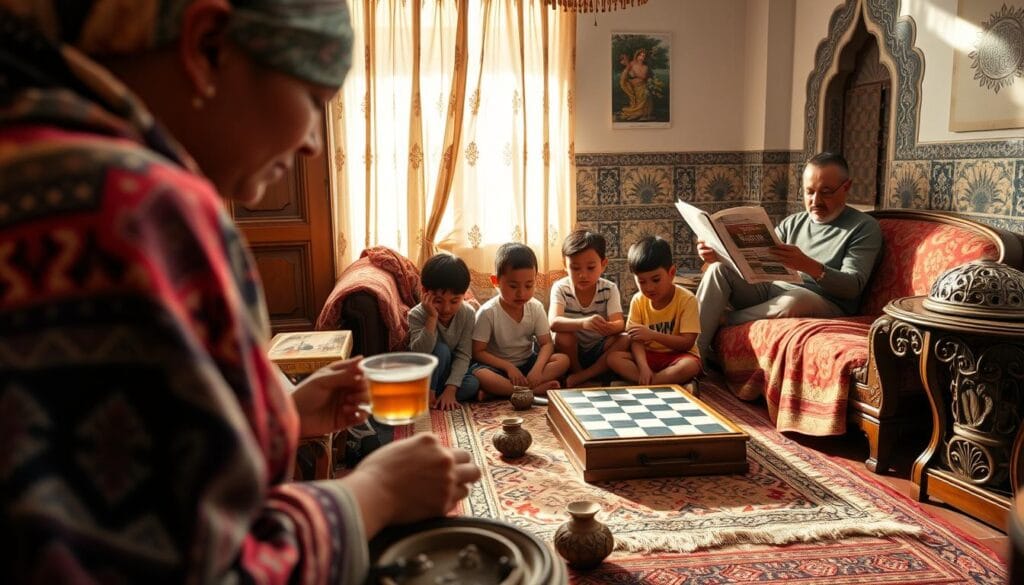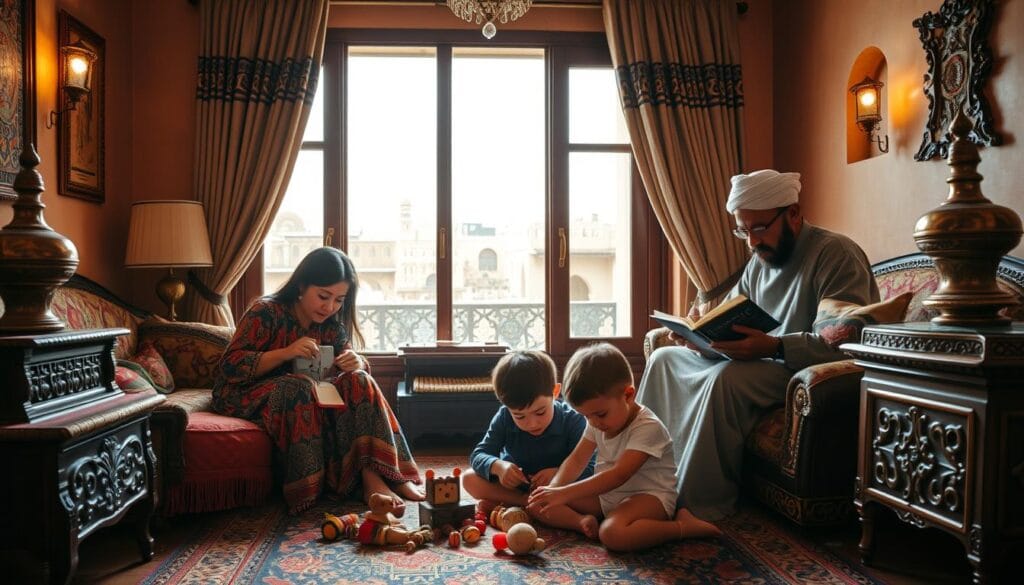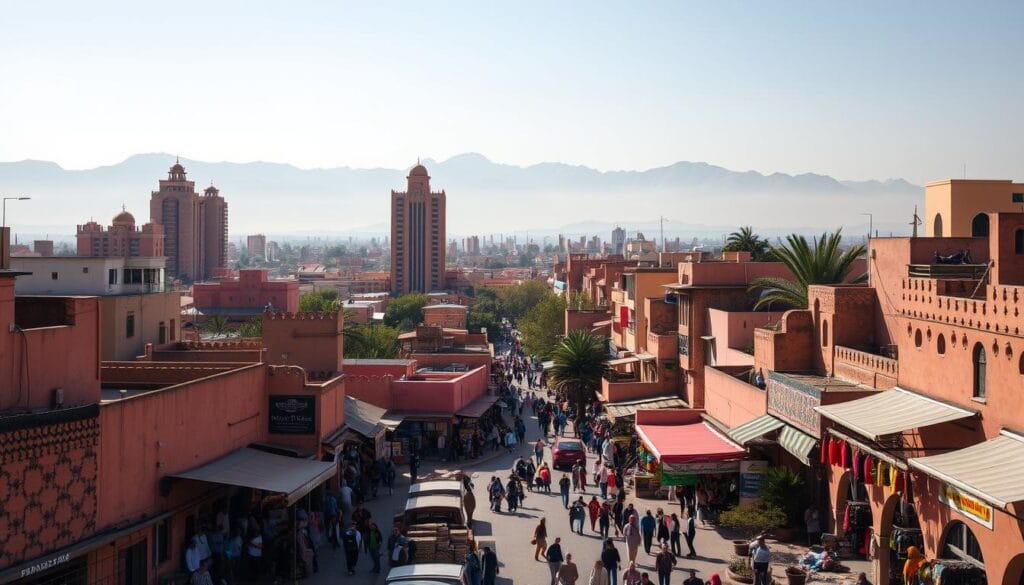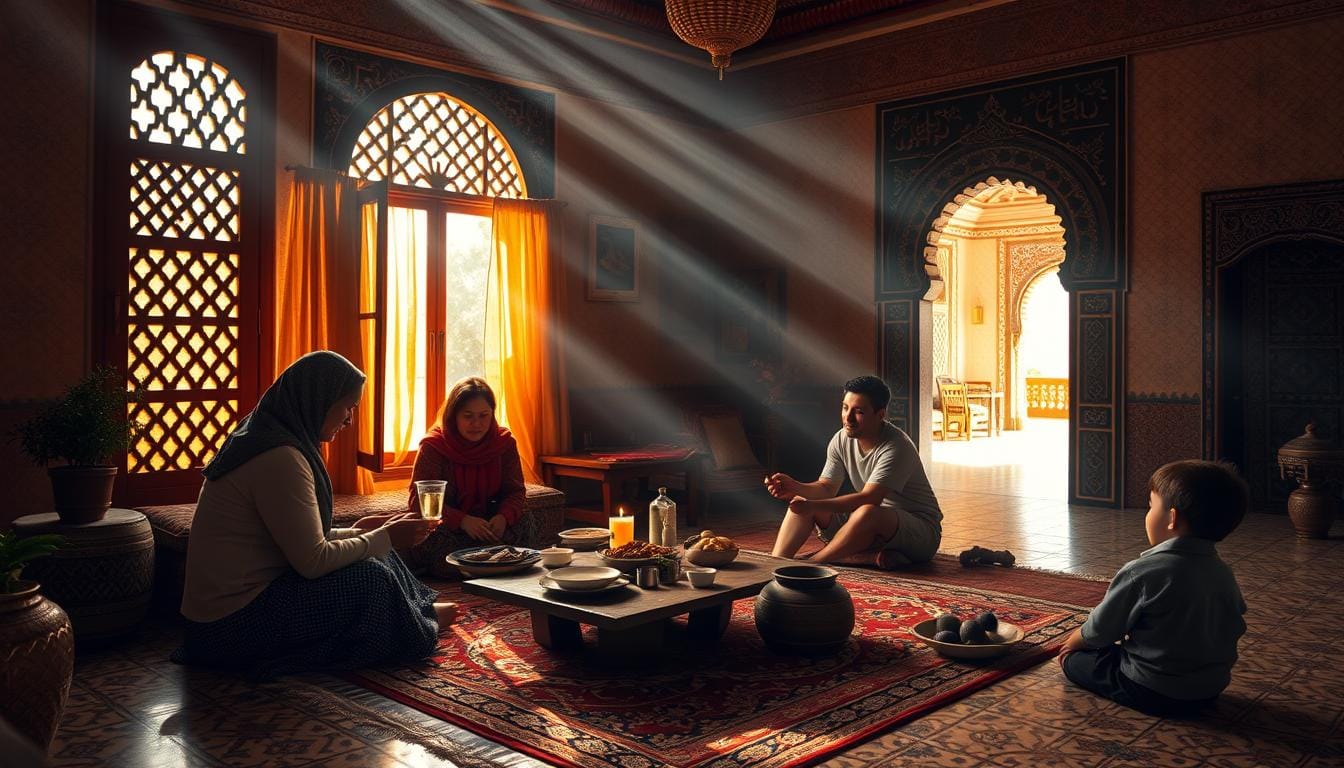What Family Life in Morocco Looks Like Today
What Family Life in Morocco. Ever curious about daily life for families in Morocco? As you dive into Moroccan traditions, you’ll find a world of cultural influences. These shape family life in amazing ways.
Moroccan families are tight-knit, with strong bonds. These bonds are rooted in the country’s history and Islamic heritage. Traditional family structures, daily routines, and cultural celebrations are key to their lives.
Learning about these aspects gives you a peek into morocco culture. It shows how family is at the heart of it all. This understanding will make you appreciate Moroccan family life even more.
Understanding Moroccan Family Structures
Moroccan families are deeply rooted in a rich cultural heritage. Their family structures are complex, influenced by tradition, cultural norms, and history.
What Family Life in Morocco: Traditional Family Hierarchies
In Moroccan society, family hierarchies are key. Respect for elders and authority is deeply ingrained. Older family members often hold positions of authority and influence. This structure goes beyond immediate family to the broader family network.
Roles of Parents and Children
In Moroccan families, parents and children have clear roles. Parents guide their children and make important decisions. Children are expected to show respect and obedience to their parents and elders. Children also contribute to family responsibilities and learn traditional values.
| Family Member | Traditional Role | Modern Influence |
|---|---|---|
| Father | Authority figure, provider | Increasingly involved in childcare |
| Mother | Caregiver, household manager | Growing participation in workforce |
| Children | Respectful, obedient, contributors to family | Increasing access to education, changing expectations |
Extended Family Influence
Extended family members have a big impact on Moroccan families. They help with decision-making, provide support, and pass down traditions. This close-knit family network is a defining characteristic of Moroccan family life, providing a sense of belonging and security.
Exploring Moroccan families shows the importance of understanding their structures. The mix of tradition and modernity shapes their daily lives and family dynamics.
Daily Life in Moroccan Households
Exploring Moroccan families reveals a mix of traditions and modern life. Their daily routines blend old customs with new ways, creating a special family atmosphere.
Typical Routines and Schedules
The day starts early in Moroccan homes. Families come together for breakfast, enjoying msemen or khobz with tea. The morning is busy with chores and getting kids ready for school.
After the morning, families tackle their daily tasks. Men go to work, and women manage the home and care for kids. Many women also earn money by working from home or running small businesses.

Meal Times and Food Culture
Meal times are special in Moroccan culture, bringing families closer. Moroccan cuisine is famous for its flavors and smells, with tagine and couscous being favorites. Making meals is a family effort, with recipes shared for generations.
At meals, you’ll see customs like eating with your right hand. It’s also a time for talking and sharing stories, strengthening family bonds and traditions.
Food plays a big role in Moroccan life, not just at home. It’s central to social events and celebrations, showing Moroccan hospitality. Understanding these customs helps us see the value of family and community in Moroccan daily life.
Celebrating Cultural Traditions
In Morocco, cultural traditions are more than just events. They are a way of life that strengthens family bonds. Exploring Morocco’s rich cultural heritage shows the importance of traditional celebrations in family life. These events are key to Morocco culture, bringing families together and creating a sense of community.
Festivals and Holidays in Moroccan Families
Moroccan families celebrate many festivals and holidays each year. Each one has its own customs and traditions. Some of the most important celebrations include:
- Eid al-Fitr, marking the end of Ramadan, is a time for family gatherings and feasting.
- The Marrakech Popular Arts Festival, showing off Moroccan music, dance, and crafts.
- Independence Day, celebrating Morocco’s independence, is a national holiday filled with patriotic events.
These festivals often happen at famous landmarks in Morocco, like the Bahia Palace in Marrakech or the Hassan II Mosque in Casablanca. This makes them even more special.
Religious Observances and Family Gatherings
Religious observances are very important in Moroccan family life. During Ramadan, families come together to break their fast. They share meals and stories.
Other important religious events include:
- Mawlid al-Nabi, celebrating the Prophet Muhammad’s birth, is marked with religious gatherings and festivities.
- Eid al-Adha, the Feast of Sacrifice, is a time for families to come together and share meat with those in need.
These religious events are a big part of Moroccan traditions. They help strengthen family ties and spiritual values.
Gender Roles within Moroccan Families
Exploring Moroccan family life shows us how gender roles are tied to culture and religion. It’s key to understanding the depth of family life in Morocco.
Women’s Role in the Household
Women in Moroccan homes are essential for daily tasks. They handle cooking, cleaning, and childcare. Their work keeps the household running smoothly.
Key Responsibilities:
- Managing household chores
- Caring for children and the elderly
- Preserving cultural traditions through cooking and family rituals
Men’s Responsibilities
Men are often seen as the breadwinners, working outside to support their families. But they also make family decisions and teach cultural values to their kids.
It’s interesting to see how men’s roles are changing in Moroccan families. Modern times are bringing new responsibilities.
| Traditional Roles | Modern Trends |
|---|---|
| Women: Household management, childcare | Increasing participation in the workforce |
| Men: Financial provision, decision-making | More involvement in household chores and childcare |

The mix of old gender roles and new influences is changing Moroccan families. As you learn more about family life in Morocco, you’ll see how these shifts affect the country’s culture.
Education in Moroccan Family Life
Education is very important in Moroccan family life. It shows the country’s deep love for knowledge. Families work hard to make sure their kids get a good education.
Cultural Significance
Education’s value in Morocco comes from its rich history and culture. Moroccan arts and culture celebrate learning. Many famous figures are honored for their knowledge.
Parents pass on the love for education to their kids. They push their children to do well in school. This includes both Islamic studies and modern education.
Educational Approaches
Moroccan families use different ways to teach their kids. Some go to public schools, while others choose private or international schools. It depends on what the family wants and can afford.
The rich history of Morocco shapes its schools. Schools mix old and new ways of learning. Some teach Arabic and Islamic studies, while others focus on French or English.
As Morocco tourism grows, learning English becomes more important. It helps kids get ready for a world that’s more connected.
The Influence of Urbanization
The move from rural to urban areas is changing Moroccan family structures a lot. People go to cities for better jobs, which changes family roles and how they work together.

Shifts in Family Dynamics
Urban living changes family life a lot. Younger people get more freedom because of education and jobs. This changes the old way families were organized, where older people were in charge.
Adapting to city life also changes daily routines and cultural practices. For example, how and when families eat is changing because city life is faster. You might see old customs in Morocco mixing with new ones, making a unique city culture.
Migration Patterns and Their Impact
Migration is also changing family structures in Morocco. Moving from the countryside to cities or other countries tests family bonds. But, many Moroccans keep strong family and community ties, even when far apart. This is seen in their support for morocco tourism and local businesses.
Urbanization also changes how families interact with their environment. Visiting famous landmarks in Morocco helps families connect with their heritage and make new memories.
In summary, urbanization is bringing big changes to family life in Morocco. Families are finding a new way to be together, mixing old customs with today’s world.
Family and Community Connections
Community is key in Moroccan families, creating a sense of belonging and support. In Morocco, family and community are closely linked. Neighbors and community members often play big roles in family life.
Neighbors and Community Importance
In Moroccan culture, neighbors are like family. They offer emotional support, help with chores, and join in family celebrations. This tight-knit community is a core part of Moroccan traditions, building unity and cooperation.
Neighbors and community are also key during festivals like Eid al-Fitr and Eid al-Adha. These events help strengthen bonds and give families a chance to connect.
Social Networks and Support Systems
Moroccan families count on their social networks for support. These networks are built through community, friendships, and family ties. The riads (traditional Moroccan houses) and communal spaces in villages are where people meet and bond.
The role of Moroccan cuisine in bringing people together is huge. Traditional meals are at the heart of family and community gatherings. They symbolize hospitality and generosity, strengthening social bonds and community ties.
By understanding these connections, we can see how they make Moroccan family life richer. They also play a big part in the country’s social fabric.
Parenting Styles in Morocco
Morocco’s rich culture shapes its parenting styles, blending tradition and modernity. Parents aim to keep cultural values alive while using today’s parenting methods. This mix is seen in how they raise their kids.
Combining Tradition with Modernity
Moroccan parents walk a fine line between old and new. They want to share Morocco’s cultural heritage with their kids, like respect for elders and faith. Yet, they also use modern ways to support their children’s feelings and growth.
This mix shows up in daily life. For example, while family respect is key, parents now talk openly and encourage feelings. This change shows Morocco’s move towards a more open world.
| Traditional Practices | Modern Approaches | Impact on Children |
|---|---|---|
| Emphasis on respect for elders | Encouraging independence and self-expression | Develops social skills and confidence |
| Strong religious observance | Incorporating secular values and tolerance | Fosters a balanced worldview |
| Collectivist family values | Promoting individual goals and aspirations | Enhances personal growth and family cohesion |
Balancing Discipline and Affection
Moroccan parents also balance strictness and love. Old ways focused on discipline, while new methods focus on emotional care.
So, many families mix both. They keep the structure of old ways but add the warmth of new ones. This mix helps kids feel safe and learn to handle their feelings well.
Learning about these parenting styles helps us see how Moroccan families evolve. They keep their culture alive while adapting to new times.
Impact of Modern Technology
Modern technology is changing family life in Morocco. It’s changing how families talk, find information, and have fun.
Communication Changes in Family Life
Smartphones and the internet have changed family communication. Video calls and messaging apps help families stay close, even when apart.
Now, kids can easily connect with family members. This makes them feel closer, even when they’re far away.
Social Media’s Role
Social media is big in Morocco, including for families. Sites like Facebook and Instagram help families share news and moroccan arts.
It lets families share their culture and life with others. This can help morocco tourism by showing off the country’s customs in morocco.
| Aspect of Family Life | Pre-Technology | Post-Technology |
|---|---|---|
| Communication | Primarily face-to-face or letter writing | Video calls, messaging apps, and social media |
| Information Access | Limited to local news and community gossip | Global news and information at fingertips |
| Leisure Time | Family gatherings, traditional games | Online gaming, streaming services, social media |
By using modern tech, Moroccan families are getting closer. They’re also connecting with the world and keeping their culture alive.
Challenges Facing Moroccan Families Today
Morocco is changing, and its families are facing new challenges. The Morocco culture and Moroccan traditions are being tested by today’s world.
Moroccan families are dealing with economic and social issues. These challenges show how strong and adaptable Moroccan families are.
Economic Pressures
The cost of living in Morocco is going up. Many families are finding it hard to afford basic needs. The unemployment rate, mainly among the young, is a big worry.
Young Moroccans are looking for jobs abroad. This is causing a brain drain that hurts the economy.
The economic pressure is also changing family life. Parents are working more, spending less time with their kids. This is affecting family bonding and the passing down of Moroccan traditions.
Social Changes and Adaptation
Social changes are also a big challenge for Moroccan families. Modernization and urbanization are changing family structures and values. There’s a shift towards nuclear families, away from the traditional extended family setup.
The role of women in Moroccan society is changing too. More women are working, which is changing household dynamics. While it brings economic stability, it also makes balancing work and family harder.
- The adaptation to new social norms and values.
- The integration of modern technology into daily life, affecting communication and social interactions.
- The preservation of cultural heritage in the face of globalization.
Moroccan families are adapting to these changes while keeping their cultural identity. Visiting famous landmarks in Morocco and taking part in cultural events help families stay connected to their heritage.
Looking Ahead: The Future of Family Life in Morocco
Moroccan families are facing the challenges of modern life while keeping their cultural traditions alive. They blend old customs with new ideas in many areas. This is seen in their food, arts, and how they decorate their homes.
Shifting Roles and Cultural Identity
The roles in Moroccan families are changing, thanks to the country’s history and culture. Families are adapting to new times, finding a balance between old and new. This balance is seen in how they use technology and hold onto traditional values.
Preserving Heritage and Embracing Innovation
Moroccan families are working to keep their cultural heritage alive while welcoming new ideas. They mix old traditions with modern ways in their daily lives. This ensures their cultural roots stay strong as they move forward.

